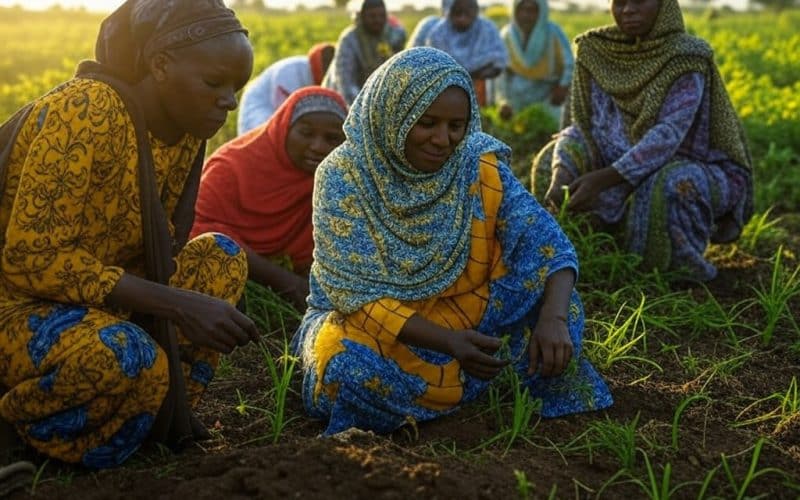
A recent article on Heroes Of Sahel by Isabelle Naïssem caught our attention a few days ago. The article presents the groundbreaking work by Lydie Beassemda. Her journey from an agricultural development planner to a minister and political leader was instrumental in transforming Chad’s agricultural landscape.
Time to make a portrait of this wonderful and truly inspiring woman.
Situation in Chad
In Chad, agriculture is not just an economic activity but a sector that provides both dignity and social mobility. As such it offers numerous opportunities for socio-economic growth.
Not surprisingly agriculture is the real backbone of Chad’s economy, engaging approximately 80% of the population in farming, livestock rearing, or fishing. And the sector contributes significantly to the country’s GDP, with a focus on both subsistence and cash crop production.
Key Agricultural Products:
- Food Crops: Staples such as millet, sorghum, and maize dominate cultivation, primarily for domestic consumption.
- Cash Crops: Cotton stands as the main cash crop, with other exports including gum arabic and sesame.
Chad however also faces quite some challenges. The three main ones are:
- Limited Value Addition: There’s minimal processing of agricultural products, leading to a reliance on raw exports.
- Infrastructure Deficiencies: Poor infrastructure hampers market access and distribution networks.
- Climate Variability: Frequent droughts and unpredictable rainfall patterns adversely affect crop yields.
Luckily, the Chadian government has prioritized agricultural industrialization and export enhancement in its national development plans. Efforts are also underway to diversify the economy beyond oil dependence by strengthening agricultural value chains.
Lydie Beassemda: From Agricultural Planning to Policy-Making
One of the most important figures in Chad when it comes to agriculture is Lydie Beassemda. She is an engineer in agro-industries and a development planner. Over a decade, she worked closely with producers’ organizations, providing advisory support before transitioning into policy-making. She also played a crucial role in drafting Chad’s first national nutrition and food policy in 2013 and later, the first national agricultural policy in 2018.
As Minister of Production, Irrigation, and Agricultural Equipment (2018-2019), Lydie Beassemda identified structural challenges that hinder agricultural transformation and modernization in Chad. Despite numerous international projects and programs supporting the sector, the country struggled to move toward a sustainable green economy. Beassemda used her role in government to address these issues at both the policy and grassroots levels.
A Deep-Rooted Passion for Agriculture
Beassemda’s commitment to agriculture is rather personal. Her parents, despite not being professional farmers, developed a family farm in 1979. This early exposure led her to pursue a doctoral thesis in Transport and Logistics applied to agriculture.
Au Tchad, le métier de l’agriculture est passionnant et procure de la dignité à tout homme qui s’y adonne. Il offre un éventail de spécialisations et d’opportunités d’activités socioéconomiques. Lydie Beassemda, est l’une de ces femmes qui ont marqué le domaine agricole.
— HeroesOfSahel (@heroesofsahel) January 28, 2025
She then actively started supporting local farming activities, especially in Moundou (Logone Occidental) and Kelo (Tandjilé), where she provides resources for farming campaigns. She also contributed to the development of key agricultural value chains such as shea butter and peanuts, which in its turn strengthened Chad’s agribusiness sector.
Empowering Women in Agriculture
At the moment Lydie Beassemda plans to launch a cooperative for women and young people. The objectives of the cooperative are these:
- Skill Development: Offer training programs to enhance agricultural practices among women and youth, focusing on modern techniques and sustainable methods.
- Resource Access: Facilitate access to essential resources such as quality seeds, tools, and financial services, enabling participants to improve productivity.
- Market Integration: Assist members in accessing local and international markets, ensuring fair pricing and reducing barriers to entry.
- Community Building: Foster a sense of community among participants, encouraging collaboration and shared learning experiences.
Doing this, the cooperative aims to strengthen the role of women and youth in the agricultural sector, promoting gender equality and reducing unemployment. It will equally increase income levels and financial independence among participants. And finally it will focus on environmentally friendly farming practices that ensure long-term productivity.
A Vision for Chad’s Agricultural Future
Currently, President of the Steering Committee of the Forum for the Development of Agricultural Value Chains (AGRIFORUM), Lydie Beassemda plans to develop five strong agricultural value chains that integrate small farmers into Chad’s agro-economic models. She made it her mission to make agriculture economically viable for smallholder farmers by promoting agribusiness and laying the foundations of an agro-industrial economy.
Her efforts culminated in the third edition of AGRIFORUM in 2024, held in Moundou. The forum aimed to equip farmers with technological, digital, and innovative tools, preparing them for a modern agricultural future.
A Leader in Politics and Human Rights
Apart from her agricultural contributions, Lydie Beassemda is an advocate for human rights and gender equality. She has been a university lecturer and since 2018, the President of the Party for Democracy and Full Independence (PDI).
In March 2021, she became the first woman to run for Chad’s presidency, securing 3.16% of the vote. Although ‘only’ 3.16% it was a groundbreaking achievement for female political representation in the country.
